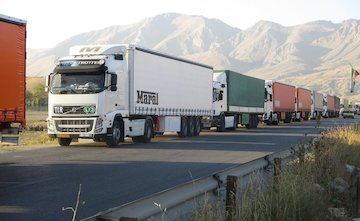Road freight transit through the territory of Islamic republic of Iran has demonstrated a major increase in the last year by reaching freight transit to 9.3 million tons and transit traffics to 436000.
This is achieved in the post covid-19 conditions with different global and regional constraints due to the pandemic. "For instance, we still witness that Turkmenistan borders are closed to direct transit of trucks to the Central Asian countries. Similarly, due to the economic situation of Afghanistan, after the return of Taliban rule, transit of goods to this country has significantly decreased", Javad Hedayati, the director-general of Iran Transit and International Transportation Bureau, explained.
Given the condition, achieving a record of 98% growths in truck transit is very valuable that shows unique potentials of Iran.
In March 2022, the number of road freight transits reached to 43,000 trucks which was a new record compared to the average record in the last year (which was 33650 trucks).
Following the 13th Government of Iran's approach, Iran is pursuing political and commercial convergence in the region. The evidence is cooperation within the framework of regional treaties like Shanghai, ECO, and Eurasia. After removal of banking and insurance sanctions against Iran, once the JCPOA is restored, Iran is expected to hit a historic record of 20 million tons freight transit, as it regains political stability.
To this end, according to Hedayati, the country is needed to provide other necessary requirements including a unified administrative structure to manage transit through Iran's territory, upgrading soft and hard infrastructures, activating various custom facilities predicted in the law such as freight transshipment in the ports, and facilitating traffics at border crossing terminals by smart, knowledge-based technologies.
